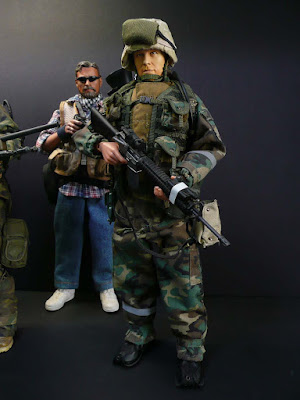After the success of
Operation Enduring Freedom in Afghanistan, the US turned its attention on Iraq. From 20 March to 1 May 2003, the invasion of Iraq was spearheaded by the United States (with a force of 250,000), backed by British forces (45,000) and smaller contingents from Australia (2,000) and Poland (194). At 5:34 AM Baghdad time on 20 March 2003, the military invasion of Iraq began. The invasion of Iraq, led by US Army General Tommy Franks, began under the codename "Operation Iraqi Freedom", the UK codename "Operation Telic" and the Australian codename "Operation Falconer". The United States Marine Corps (USMC) played a major role in "Operation Iraqi Freedom" with the US 1st Marine Division fighting through the Rumaila oil field and then moving north to Nasariyah, a Shi'ite dominated city with important strategic significance as a major road junction and its proximity to nearby Talil Airfield.

Due to the success of the US handling of the media during "
Operation Desert Storm (2 August 1990 – 28 February 1991)" which was a heavily televised war - for the first time people all over the world were able to watch live pictures of missiles hitting their targets and fighters taking off from aircraft carriers, the US went one step further and at the start of the war in March 2003, as many as 775 reporters and photographers were traveling as embedded journalists. When asked why the military decided to embed journalists with the troops, Lt Col Rick Long of the US Marine Corps replied, “Frankly, our job is to win the war. Part of that is information warfare. So we are going to attempt to dominate the information environment.”


"Walt" from the USMC Force Recon by Dragon, 2003

Hot Toys' USMC sniper from the 23rd Marine Regiment with Dominic Purcell head sculpt

War Correspondent by Chronicle Collectibles, 2004 - a distant cousin of "
Joe Shooter"

"Leon" from 1st Marine Expeditionary Unit by Dragon, 2003

 Due to the success of the US handling of the media during "Operation Desert Storm (2 August 1990 – 28 February 1991)" which was a heavily televised war - for the first time people all over the world were able to watch live pictures of missiles hitting their targets and fighters taking off from aircraft carriers, the US went one step further and at the start of the war in March 2003, as many as 775 reporters and photographers were traveling as embedded journalists. When asked why the military decided to embed journalists with the troops, Lt Col Rick Long of the US Marine Corps replied, “Frankly, our job is to win the war. Part of that is information warfare. So we are going to attempt to dominate the information environment.”
Due to the success of the US handling of the media during "Operation Desert Storm (2 August 1990 – 28 February 1991)" which was a heavily televised war - for the first time people all over the world were able to watch live pictures of missiles hitting their targets and fighters taking off from aircraft carriers, the US went one step further and at the start of the war in March 2003, as many as 775 reporters and photographers were traveling as embedded journalists. When asked why the military decided to embed journalists with the troops, Lt Col Rick Long of the US Marine Corps replied, “Frankly, our job is to win the war. Part of that is information warfare. So we are going to attempt to dominate the information environment.”
 "Walt" from the USMC Force Recon by Dragon, 2003
"Walt" from the USMC Force Recon by Dragon, 2003 Hot Toys' USMC sniper from the 23rd Marine Regiment with Dominic Purcell head sculpt
Hot Toys' USMC sniper from the 23rd Marine Regiment with Dominic Purcell head sculpt War Correspondent by Chronicle Collectibles, 2004 - a distant cousin of "Joe Shooter"
War Correspondent by Chronicle Collectibles, 2004 - a distant cousin of "Joe Shooter" "Leon" from 1st Marine Expeditionary Unit by Dragon, 2003
"Leon" from 1st Marine Expeditionary Unit by Dragon, 2003

No comments:
Post a Comment